Road crashes are costing Canterbury $1.4 million a day, figures show.The New Zealand Transport Agency's Canterbury Road Safety Report estimates the social cost of fatal, serious and minor road crashes last year at a staggering $4.3 billion nationally, with Canterbury's share amounting to $509.6m, or about $1.4m a day.The social cost combines the loss of life and life quality with the loss of output due to injuries, medical costs, legal costs and property damage.The average value of a loss of life is estimated by the amount the public would be willing to pay for a safety improvement to prevent a death.Based on the report's findings, the crash that claimed the lives of two people in Christchurch on Thursday night would have a $3.8 million cost, the average cost of a fatal urban crash.Poor observation, poor handling, speeding, fatigue and alcohol were cited as factors in Canterbury crashes...
News: August 2010

Aug
TNO Quality of Life, Leiden, The Netherlands. ingrid.hendriksen@tno.nlOBJECTIVE: To study the association between commuter cycling and all-cause sickness absence, and the possible dose-response relationship between absenteeism and the distance, frequency and speed of commuter cycling.METHOD: Cross-sectional data about cycling in 1236 Dutch employees were collected using a self-report questionnaire. Company absenteeism records were checked over a one-year period (May 2007-April 2008). Propensity scores were used to make groups comparable and to adjust for confounders. Zero-inflated Poisson models were used to assess differences in absenteeism between cyclists and non-cyclists.RESULTS: The mean total duration of absenteeism over the study year was more than 1 day shorter in cyclists than in non-cyclists. This can be explained by the higher proportion of people with no...
Aug
This issue is all about cycling safety.CONTRIBUTED ARTICLESA note on the central stories of fatal and other cyclist accidents in Adelaide- by TP Hutchinson and VL Lindsay . . . . . . . . . . . . . . . . . . . . . . . . . . . . . . . . . . . . . . . . . . . . . . . . . . . . . . . 12Piloting a Safe Cycle education program – by Eddie Wheeler . . . . . . . . . . . . . . . . . . . . . . . . . . . . . . . . . . . . 14Encouraging safer cycling through the NSW BikePlan - by Lyndall Johnson and Matt Faber . . . . . . . . . . . . 15Cycling safety in the Australian Capital Territory – by Peter Thompson. . . . . . . . . . . . . . . . . . . . . . . . . . . . . 16Cycling safety in Victoria – by staff of VicRoads, compiled by Juliet Reid. . . . . . . . . . . . . . . . . . . . . . . . . . . 19The Australian Bicycle Council and the National Cycling Strategy – by Fiona MacColl...
Aug
Can you advise me on this dilemma? Wellington has bus only (bikes forbidden) and bus lanes (bikes ok). A couple of bus lanes lead into traffic signals, where there is a 'B" green light, which operates before the green light for other parallel lanes. If I find myself in the bus lane, can I go on the green B, or do I need to wait (with a line of buses behind me) for the general green?Thanks
Aug
Cyclists on footpaths The arguments between Motorists and cyclists continue with no end in sight. I am moved to write this after being hit by a car last Wednesday. (Re: Bums on Bikes, Write On, August 4) I am a cyclist and I run red lights frequently and will continue to do so as well as riding on footpaths. I do this not to deliberately annoy motorists but merely get from A to B safely in one piece.Roads are for cars and footpaths are for pedestrians therefore us cyclists are the “lepers” of the road caught in no mans land, were we’re damned if we do and damned if we don’t.Avoidance is the best policy when on a bike amongst traffic and if that means jumping the lights and riding footpaths to stay out of way of cars then so be it. However I am also a motorist so I can see the other point of view.Here’s an example. Whilst driving up Adelaide Rd from the John St intersection I...
Aug
Cycling advocates are calling for a ceasefire in the latest skirmish between some drivers and cyclists. A public dispute has been sparked by news of an Auckland cyclist who uses video cameras and lasers to track aggressive drivers.TVNZ story here. Cycling is a great way to get around, and an activity enjoyed by more than a million New Zealanders says Cycling Advocates' Network (CAN) spokesperson, Patrick Morgan. Mr Morgan says, "While riding two abreast is legal, cyclists need to show courtesy to other road users. This means riding in single file on busy roads." "Our advice for drivers is to show similar courtesy: wait until it is safe to pass, and give cyclists plenty of room." "We all win when cyclists and motorists share the road with care." "Every person on a bike means there are fewer cars on the road. More bikes means less congestion." CAN is delighted to see the latest "Code for...
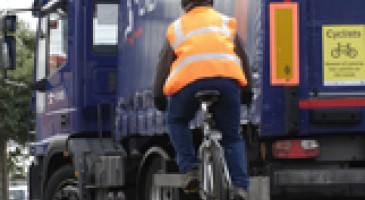
Aug
Cycling is on the increase in New Zealand and although it is generally becoming safer, by following a few simple tips we can prevent crashes. Most cyclist and truck or bus collisions happen when vehicles turn left at traffic lights or other intersections. Risk can be minimised if drivers and cyclists alike are aware of each other and behave responsibly.Tips for cyclistsCycle sensibly and assertively to help yourself stay safe. Recognise that truck or bus drivers may not be able to see you Never cycle up the left side of a truck or bus stopped at a junction Look out for trucks or buses turning left from beside or behind you Don't stop too close to the front of a stopped truck or bus Take up a visible position at lights: three metres out in front and not by the left kerb or very close to the truck or bus About blind spots The blind spot can be the full length of the...
Aug
Aaron Oaten, the brain-damaged son of "the Helmet Lady" who furiously campaigned to make cycle helmets compulsory in New Zealand, has died at 37. Mr Oaten passed away in Palmerston North's Arohanui Hospice on Saturday, after 24 years living as a tetraplegic, paralysed from the neck down after a bicycle accident in 1986. Aaron, aged 12, was cycling to school when he was knocked from his 10-speed bike by a car on Pioneer Highway. The instant his head hit the concrete gutter, his life changed forever. Aaron slipped into a coma. When he awoke eight months later, he was paralysed and unable to speak, his body rendered useless, his mind trapped inside. His mother, Rebecca Oaten, went on a crusade to make sure her son's accident was not ignored. Dubbed The Helmet Lady by the nation's children, for six years she travelled to schools around the country to push the importance of...
Aug
Chris Rissel says the helmet laws put people off riding bikes //--> A public health expert has called for laws making the wearing of bike helmets compulsory to be repealed, to encourage more people to ride bikes. Australia became the first country to make riding without a helmet illegal in 1991. Associate Professor Chris Rissel, from Sydney University's School of Public Health, says the greatest drop in head injuries was in the 80s - before the laws were introduced - because of road safety campaigns and speed controls. He says the number of head injuries has remained steady since then, creating a case to overturn the helmet law. "What it does is it puts people off cycling and makes people think that cycling's a dangerous activity, even though it's a really healthy thing to do and it increases people's physical activity," he said. "And you're seeing things like in the...
Aug
Hmmmm! so maybe we should get our transport minister to ride a bike and hope he...... http://www.msnbc.msn.com/id/38717648/ns/us_news-life/ Sridhar
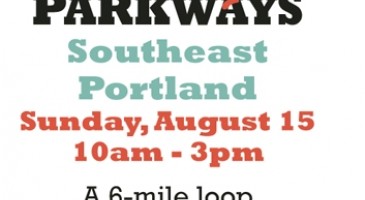
Aug
Some of you may have heard of "ciclovia", the car-free street events that originated in Bogota, Colombia. In Portland, Oregon, they're known as "Sunday Parkways" and they've been a hit there since the first one in 2008.Sunday Parkways take place at various locations throughout Portland about once a month, and involve closing off a loop of ~10km of streets for 5 hrs so that people can walk, ride, scoot, skate, whatever without the distraction of motor traffic (yes, if you're a local you can still access your house, although they encourage you not to drive if you can avoid it).Local street closures for Sunday Parkway in Portland (these are staffed by volunteers)Unlike many ciclovia, where main roads are closed down, Portland has opted to close off mostly local streets, including some routes along its "bike boulevards". Where the route crosses main streets, Police are...

Aug
The ASB Cycle Friendly Awards for 2010 ceremony will be held, in Wellington on Friday 29 October 2010 with sponsorship from Wellington City Council.Friday 29 October 2010 at 5:30pm: ASB Cycle Friendly Awards at Wellington City Council Chambers, Old Town Hall Building, 111 Wakefield St. Map.Entrance is opposite Michael Fowler Centre, at the north end of Cuba St. There is bike parking at the door. Bus info here.The Cycle Friendly Awards were devised by CAN and have been running since 2003. The purpose of the Awards is to acknowledge and celebrate some of the most notable achievements in the country that are helping to promote cycling and to create a cycle-friendly environment.More info here.
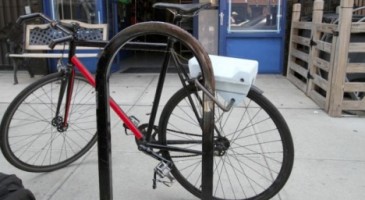
Aug
Sami recently wrote about the new Sobi bike system; It is a wonderful concept, and very different from bike sharing systems we have seen in Paris, Montreal and other cities. Urban systems like Velib in Paris or Bixi in Montreal are expensive to set up and maintain. Sobi (Social Bicycle System) is a simpler system. CrunchGear explains that it is based on smart phone technology; instead of being attached to a fixed stand, it relies on GPS and mobile communications, and a big, secure lock that can attach to any bike rack, or any bike for that matter. It is really clever; the works are in the bike lock. Instead of going to a bike stand like you do in Paris, your smart phone or computer tells you where the nearest bike is. At night they are supposed to be returned to a hub location, and if you do not take it back, you get charged two bucks. But any other user can see where out-of-...
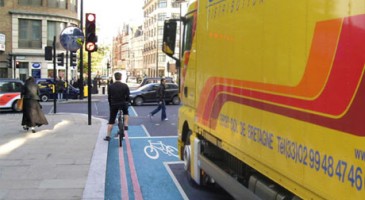
Aug
A new campaign calls for transport firms to send their HGV drivers on cycle-awareness courses and fit their vehicles with camerasThe risk to cyclists from large lorries is a problem in all urban areas. Thankfully crashes are rare – on average about eight cyclists per year are killed by lorries in London, accounting for about half the cyclist deaths in the capital. Across the UK, about 28 are killed by lorries each year, with 70% of these in urban areas. But worryingly these accidents are always serious, and saturation media coverage of each one contributes greatly to the perception that cycling is much more risky than it is. The financial costs of such road fatalities are vast, too, estimated at over £1.6m per person, so there are compelling reasons to make prevention a priority before the terrible human cost of each crash has even been considered.Lorries...
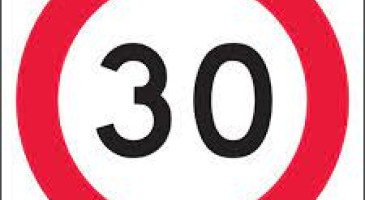
Aug
The single biggest road safety issue in New Zealand today is speed - drivers travelling too fast for the conditions.Lower speed limits don’t just save lives – they make NZ towns and cities better places to live (source: Simon Kingham in The Conversation, 2022)In 2008, excess or inappropriate speed was a factor in:* 34 percent of all road deaths (127 deaths)* 17 percent of all reported injuries from road crashes (2629 injuries).As well as road safety, reducing speeds has many benefits for our communities, including encouraging more walking and cycling. It is a cost-effective and popular option that many NZ towns and cities are adopting.Even a small reduction in speed has huge safety benefits.A 5% reduction in average speed delivers reductions of 25% in deaths, 15% in serious injuries and 8% in minor injuries.A cyclist or...
Aug
Cyclists could be forced to rethink their travel plans as Wellington's new trains cut the amount of space available for bikes in peak times. Greater Wellington regional council is reviewing the rules for bikes on trains, with a policy due to go out for public consultation in the coming weeks. Among the changes being considered is a ban on bikes in peak times – a move labelled short-sighted by cycling advocates. The policy review was prompted by the Matangi trains being introduced to Wellington – the first of which arrived last month – as part of a $500 million overhaul of the rail network. The Matangi carriages require five seats to be flipped up for each bike, prompting the proposed peak-time ban. Off-peak, three bikes per two carriages would be allowed, up from the present two. The restriction would apply to trains coming into Wellington between 7am and 9am, and those leaving...
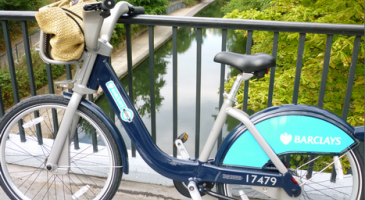
Aug
It's here and it's exciting: the new London Barclays Cycle Hire is open for business. Everywhere there are stands of shiny new bicycles just waiting to be ridden. And there are perplexed looking tourists and Londoners wondering how on earth they can get one. It's easy if you live here: for now only people with a registered address can become a member (membership has its privileges) the rest of the world will have to wait until later in the season. The only drawback is that when all is said and done, you are still riding on the streets of London and that is scary! First the system: after you register for membership you get an electronic key. You put the key in the slot, a light shines red if the bicycle is not available, amber while your details are being checked and green when they are recognized. Then you hoist the bike out. And they are heavy: each one weighs 50...
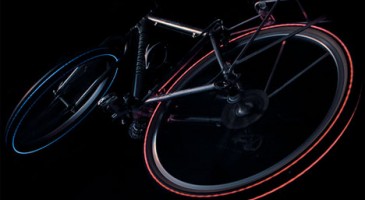
Aug
Some cyclists prefer style over safety, including when it comes to safety lighting. Cyglo Tyres appears to offer both, ditching the bulky bulb on the handlebars for LEDs embedded in the tires themselves. When spinning, they form a perfect circle of colored light. The best part is that the lights are powered by the spinning wheel itself. But there seems to be at least one significant design flaw.The design by James Tristram (which is not on the market quite yet) has a major flaw -- the fact that the bulbs are embedded into the tires. Yep, the very thing that makes it cool also makes it wasteful. Tires wear out. And they're already problematic enough to recycle. What happens when they also have e-waste mixed in with them? And, as Wired points out, this causes a problem for the perfect market -- fixie riders who have to skid to a stop and wear out about a tire a month. While they...
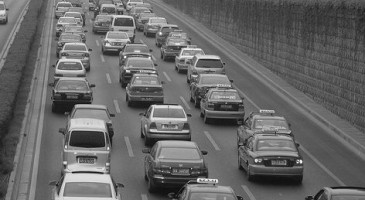
Aug
IBM (yes, the IBM) recently released a global study of traffic, surveying over 8,000 adult drivers in 20 major cities. Perhaps the results are not that surprising - traffic is perceived by drivers as getting worse in the last three years. Thirty percent of those surveyed felt increased stress while 27% reported increased anger. Twenty nine percent reported that traffic harmed their performance in work or school, and 38% reported having cancelled a planned trip due to anticipated traffic. So the two key questions are, why can't we get a grip on traffic, and why does IBM care about commuter pain and traffic patterns?Well, the answer to the first question is we haven't signficantly slowed our global patterns of purchasing cars and driving them. There are now around 750 million cars registered in the world, inching up toward one billion, and once people buy them, they drive them...

Aug
London's new bike rental scheme, like Paris's velib scheme before it, may be a huge hit. But there's a young upstart on the block that is looking to offer an alternative to these large-scale schemes—and it says it can make ordinary bike owners some money in the process. The idea behind Byke.Mobi is to take the thousands of unused bikes in a given city at any one time, and turn them into a mode of transportation for would-be cyclists, and a source of income for the owner. Founder Peter Abrahamson is clearly positioning himself as a cheaper and more grassroots alternative to the Mayor's scheme: "The service was built in a week without capital investment, unlike Boris Johnson's scheme that is costing taxpayers £140million and is being introduced across London. By involving the whole community in renting out their bikes, we are short-circuiting the need for a large taxpayer...
